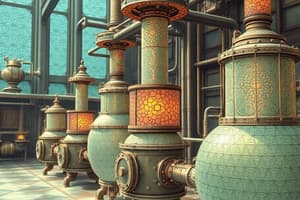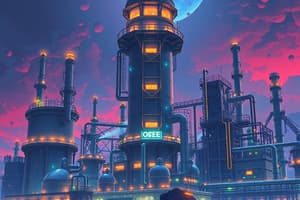Podcast
Questions and Answers
Why is there no reason to use high pressure from a thermodynamic point of view?
Why is there no reason to use high pressure from a thermodynamic point of view?
- High pressure increases the equilibrium conversion.
- High pressure accelerates the reaction rate.
- High pressure has no effect on the equilibrium conversion. (correct)
- High pressure decreases the equilibrium conversion.
What is the only positive effect on the equilibrium conversion predicted by thermodynamics?
What is the only positive effect on the equilibrium conversion predicted by thermodynamics?
- High pressure
- Large excess of hydrogen (correct)
- Presence of reaction products in the feed
- High temperature
In a region where reaction kinetics control, what happens to the reaction rate with increasing temperature?
In a region where reaction kinetics control, what happens to the reaction rate with increasing temperature?
- The reaction rate decreases.
- The reaction rate increases. (correct)
- The reaction rate remains constant.
- The reaction rate becomes zero.
What is the activation energy for the rate of reaction for the hydrodealkylation of toluene?
What is the activation energy for the rate of reaction for the hydrodealkylation of toluene?
What would be the approximate increase in reactor size if the reaction were carried out at 400 °C instead of 600 °C?
What would be the approximate increase in reactor size if the reaction were carried out at 400 °C instead of 600 °C?
What effect did the large excess of hydrogen have on the equilibrium conversion?
What effect did the large excess of hydrogen have on the equilibrium conversion?
Why is maintaining a gas phase important in a reaction?
Why is maintaining a gas phase important in a reaction?
What happens to the equilibrium conversion of a reaction if the temperature is increased?
What happens to the equilibrium conversion of a reaction if the temperature is increased?
In a high-pressure reaction, why are equal moles of reactants and products important?
In a high-pressure reaction, why are equal moles of reactants and products important?
How does an excess of hydrogen in a reaction affect the selectivity?
How does an excess of hydrogen in a reaction affect the selectivity?
What does the reaction rate equation k reaction = k0e^{−E act/RT} indicate about the relationship between temperature and reaction rate?
What does the reaction rate equation k reaction = k0e^{−E act/RT} indicate about the relationship between temperature and reaction rate?
Why is using high temperature in a reaction not justified from a thermodynamic point of view?
Why is using high temperature in a reaction not justified from a thermodynamic point of view?
Why is there a significant economic penalty for using more than 400% excess hydrogen in the reactor feed?
Why is there a significant economic penalty for using more than 400% excess hydrogen in the reactor feed?
Why is methane considered as an inert in the reactor feed?
Why is methane considered as an inert in the reactor feed?
What is the primary effect of pressure on gas phase reactions?
What is the primary effect of pressure on gas phase reactions?
Why are distillation and membrane separation mentioned as methods for handling hydrogen and methane streams?
Why are distillation and membrane separation mentioned as methods for handling hydrogen and methane streams?
What is the significance of using refrigeration when the temperature is less than 40ºC?
What is the significance of using refrigeration when the temperature is less than 40ºC?
Why is using more than 400% excess hydrogen economically unfavorable despite its benefits?
Why is using more than 400% excess hydrogen economically unfavorable despite its benefits?
Flashcards are hidden until you start studying




